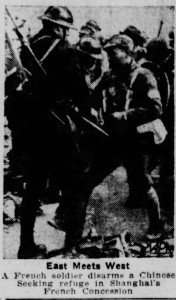Posted: June 19th, 2015 | No Comments »
This week is the 75th anniversary of the Nazi occupation of Paris in June 1940. When Paris fell and the collaborationist Vichy government, headed by Marshal Petain, took titular control of France there were obviously ramifications for France’s overseas empire. Both Indo-China and the French Concession of Shanghai went overwhelmingly with Petain with Vichy and had only small resistance organisations – the one in Shanghai very small and largely arrested while the resistance in Indo-China was largely British-sponsored. But what of those Indo-Chinese in Paris in Jun 1940? How did they react to the occupation. Probably the best daily record of life during the occupation is that of the teacher and writer Jean Guehenno who interacted with several Indo-Chinese students in Paris at the time and recorded it in his Diary of the Dark Years. Of course the conversations he records do not reflect all opinions at the time and the students he spoke too tended to be privileged, having been sent to France to study at elite ecoles, and were also now seeing the French as defeated rather than conquerors, but still interesting I think….

“January 12, 1941
A visit from N…he is a young Indo-Chinese man, astute, elegant and studious. He wrote French with a kind of love, the same meticulous care he probably exercises when he paints his Chinese characters. Yesterday I could feel he was disturbed and had clearly come for help. He no longer knows where he stands. He told me what France meant for him and his friends in the Saigon lycee four years ago, how they loved her with a romantic love, so strong and at the same time so vague and so endangered. So far away, and what a paradise she was, according to the dreams they had as they read beautiful books and flawless poems together. He talks of this slowly, taking the time to reflect between every sentence. He loves FRance still, he wants to love her. But am I aware of the wretchedness of his fellow countrymen now in France? How they have been abandoned, living only on the aid of the Red Cross and the SAlvation Army? And over there, in Indo-China, am I aware that any willingness to do something is suspect and watched over suspiciously, and how they treat young, cultivated Indo-Chinese, what care they take to maintain them in inferior positions…? And suddenly his face lights up, his eyes shine, his cheeks grow pink, and it is only now that I feel he is abslutely sincere. “You can’t understand what Japan means to us.” That’s what had been so hard for him to tell me: what he had just told me – this new love, no less romantic than his love for France had been. He explains to me that Japan isn’t what it is thought to be in Europe. There is the shining hard Samurai, but there is another Japan, one which has not forgotten the tender, humane lessons of the Buddha…And I listen to N…somewhat embarassed and ashamed. I am obliged to feel that we have not done our whole duty, and that since France had not believed strongly enough in herself – in her essence – she missed her chance for greatness and disappointed, I fear, the love of so many young people whom she could have turned into free men, our equals and our brothers. We’re paying for this lack of faith, we’re expiating this sin. How can we expect these young Indo-Chinese men to defend the empire against Siam and Japan? They would be generous indeed if they didn’t take some pleasure in seeing us humiliated by an occupier as they were by us.”
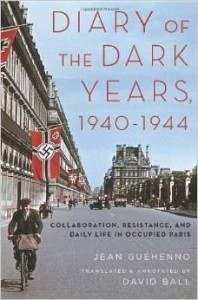
Posted: June 18th, 2015 | No Comments »
Shanghai is currently undergoing the plum rains. They appear to be heavier than normal this year and have caused extensive flooding. It happens every so often and always has. I suspect that things get a bit backed up these days as my theory is that despite massive population increase and all those new apartment blocks not as much sewer and drainage piping has been added. Certainly my observation of new blocks going up in the French Concession in the 1990s was that they just connected to the old French installed piping. A lot more people + same pipes = a lot of backing up!
Still, there have been bad years before – 1940 was a famous flood and followed 1939 which many had thought the worst on record, but 1940 was worse…
Hers is the French Ambassador in 1940 Henri Cosme (for the record a complete shit: the representative of the Vichyite collaborationist French government in China and later their ambassador to Tokyo) in a sampan on a Shanghai Street. Aahh, the old days, I wouldn’t give much for the chances of the current French Ambassador punting down a Shanghai street in a sampan to check French citizens in Shanghai are all OK?!
So here’s today’s challenge old Shanghai hands – where is he? Behind him is a sign that probably says “Palace”. the building is not big enough to be the Palace Hotel but there was a Palace Dance Hall on the Avenue Edward VII (Yanan Lu now), the road that marked the boundary between the Settlement and Frenchtown – seems logical he might have gone to the borders of Frenchtown to survey the damage? But, any other suggestions.
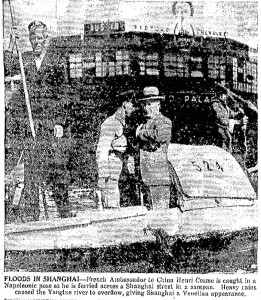
Posted: June 17th, 2015 | No Comments »
Of course, among his many other roles, Christopher Lee donned yellow face to become Fu Manchu a whole bunch of times….

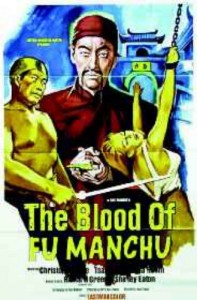


Posted: June 16th, 2015 | No Comments »
Today, June 16th is Bloomsday! If you’re not a James Joyce aficionado June 16 is the day all of the events in Joyce’s Ulysses take place. It also happens that, of late, there have been rather a lot of stories regarding the supposed popularity of Ulysses and Finnegans Wake in China (such as here). And so a little Joycean-related tale from old Shanghai…one author who may actually be having an easier time getting published in Communist China than he did in Republican China…
In September 1940 the Shanghai Municipal Police (SMP) took upon itself the task (and considering Shanghai was surrounded by the Japanese army and the war drums were beating loud one wonders if they didn’t have anything better to do!) of launching a concerted campaign to ensure that no English language books deemed ‘unfit for public sale’ (or “salaciousâ€) should be available in the territory of the International Settlement. The campaign began by seizing several copies of various D.H. Lawrence and Joyce novels available in both foreign and locally operated bookstores.
Events began on September 5th 1940 when the Chinese-owned and managed Modern Book Company’s branch at 357 Szechuan Road (now Sichuan Middle Road) was visited by officers of the SMP. A number of English language books were confiscated and delivered to Detective Superintendent (DSI) S.A. Young at Shanghai Special Branch. Titles confiscated included D.H. Lawrence’s Lady Chatterley’s Lover, Alexander Kuprin’s Yama: the Pit (concerning prostitution in Russia), James Joyce’s Ulysses, Theodoor van der Velde’s Ideal Marriage: Its Physiology and Technique and a book entitled Sex Life in France. These seizures were followed by confiscations of Lawrence’s Women in Love, The Rainbow, The Woman who Rode Away, Aaron’s Rod, The White Peacock, Sons & Lovers, Lovely Lady, The Ladybird and The Lost Girl as well as a collection of Lawrence stories, A Modern Lover. There were also several books not by Lawrence confiscated including Ely Culbertson’s The Strange Lives of One Man, a rather racy, for the time, memoir by a contact bridge player and rampant self-publicist. Additionally, a number of non-fiction titles were also seized including Theodoor van der Velde’s Sex Hostility in Marriage: Its Origin, Prevention and Treatment and Sex Techniques in Marriage, as well as Victor Robinson’s Encyclopaedia Sexualis and, finally, a book entitled The Power to Love. All of these books were essentially early sex manuals.
Eventually all of these titles were deemed “OK†by the SMP Translation Office with the exception of Lawrence’s Lady Chatterley, Kuprin’s Yama: the Pit and Joyce’s Ulysses. And so the police moved to other bookshops in the Settlement and proceeded to seek out copies of Lawrence, Kuprin and Joyce. By the end of 1940 Lawrence, Kuprin and Joyce were not to be found on the shelves of the International Settlement’s bookshops.
Of course Ulysses had long suffered censorship and banning in the UK and USA. However, a couple of things to note that make this 1940 SMP campaign against Joyce in Shanghai interesting:
1) Technically the SMP could censor whatever it felt it appropriate under the prevailing political situation in the International Settlement. However, in general terms, it seems they followed the censorship trends pertaining in Great Britain at that time. However, by confiscating and seizing for destruction copies of Joyce’s Ulysses they were extending their writ, as England had already rescinded its ban on Joyce’s novel four years earlier in 1936.
2) A number of copies of Ulysses seized by the SMP in Shanghai were returned to a book wholesaler in Tientsin (Tianjin) that supplied English language books throughout China. The copies returned to Tientsin were then reportedly placed back on sale in that treaty port which had its own, separate, censorship regime, municipal police system and local government organisations who never bothered to launch a crackdown.
Effectively with the crackdown in 1940 the SMP appears to have been making judgements independently of those being taken both in other countries and in other China treaty ports. They didn’t like Ulysses and so it was banned…
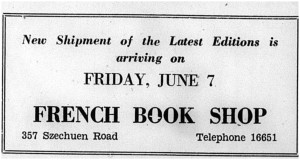
The French Book Store was run by a Mr. Bonardel, a French national. The bookstore sold French and English language titles as well as materials in some other European languages. The shop shared premises with the Modern Book Company at 357 Szechuan Road.
Posted: June 15th, 2015 | No Comments »
So we all know who Shanghai Lil was – many a song about her. But who was “Peiping Lil”, sometimes referred to as “Peking Lil” though as she operated after 1927 was technically in Peiping. She is described in the scant articles about her as “Lily Lee”, a “beautiful Chinese Mata-Hari”, a glamorous dance-hall hostess in Peking who doubled as a super-spy. After the Japanese invasion she apparently used her beauty and access to inveigle secrets out of senior army officials. However, the stories are all a bit incomplete – Japanese or Chinese secrets? In 1938 she was arrested and taken to Chungking, the then Nationalist capital. However, she was released on bail and transported to Hong Kong after her trial on espionage charges in December 1938. It is claimed she had been arrested on spying charges many times and it had been rumoured that she had been executed. The questions are too many?
Who was she really?
Who did she spy for?
If she betrayed the Nationalists why did they let her leave after her trial for Hong Kong?
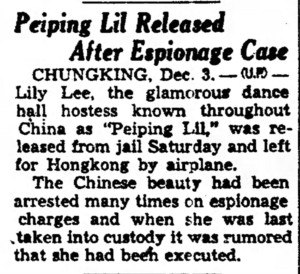
Posted: June 15th, 2015 | No Comments »
Demon pilots in the China skies….
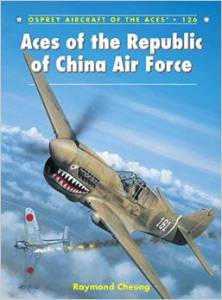
The ace pilots of the Republic of China Air Force have long been shrouded in mystery and obscurity, as their retreat to Taiwan in 1949 and a blanket martial law made records of the RoCAF all but impossible to access. Now, for the first time, the colourful story of these aces can finally be told. Using the latest research based on released archival information and full-color illustrations, this book charts the history of the top scoring pilots of the RoCAF from the beginning of the grueling, eight-year Sino-Japanese War to the conclusion of the Civil War against the Chinese Communists. Beginning as a ragged and very disparate group of planes and pilots drawn from various provincial air forces, the RoCAF gradually became standardized and was brought under American tutelage. Altogether it produced 17 aces who scored kills whilst flying a startling variety of aircraft, from biplanes to F-86 Sabres.
Posted: June 14th, 2015 | No Comments »
Every time Shanghai does a population census the numbers get more ridiculous and argued over – 18, 19, 23 million or whatever. In 1936 the city topped out at a then impressive 3,500,000 having added 135,000 odd over the last year. Of course the next year, 1937, the influx would be significantly more as refugees from Japanese attack flooded into the city. Still, in 1936, Shanghai came in fifth globally and looked likely to have more people than Berlin pretty soon. It’s been a while since Shanghai and Berlin competed on the population numbers stakes!!
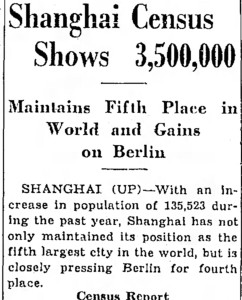
Posted: June 13th, 2015 | No Comments »
By January 1938 the Chinese nationalist soldiers that had been fighting the Japanese around Shanghai were in retreat. Here, in January 1938, a Chinese soldier attempting to enter the French Concession is disarmed by a French soldier before being admitted…..
